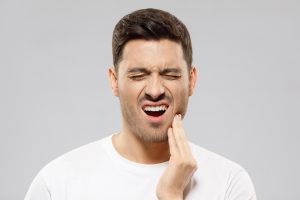Why Does My Tooth Hurt?
 Having a toothache can be a debilitating problem that affects your ability to go about your day like normal. This pain can lead to headaches and even cause a loss of appetite. To determine whether your discomfort will go away on its own or if you should see your dentist, it can help to understand why you are having a toothache in the first place. See below for common causes of oral pain and discomfort, and whether or not you may be experiencing a dental emergency that needs prompt care.
Having a toothache can be a debilitating problem that affects your ability to go about your day like normal. This pain can lead to headaches and even cause a loss of appetite. To determine whether your discomfort will go away on its own or if you should see your dentist, it can help to understand why you are having a toothache in the first place. See below for common causes of oral pain and discomfort, and whether or not you may be experiencing a dental emergency that needs prompt care.
- Sensitive: If your tooth hurts when consuming hot or cold foods, you may simply have sensitive teeth, such as from gum recession or thinning tooth enamel. However, this may also mean you have developed a cavity.
- Cavity: One of the most common causes of toothache is a cavity. The decay that occurs with a cavity can eventually irritate the nerve or lead to a damaged tooth.
- Cracked tooth: Whether from an injury or resulting from a cavity, a cracked tooth can make a tooth hurt and become more sensitive.
- Infection: Constant, throbbing pain could be a sign you have an abscess or infection, which needs to be addressed as soon as possible.
- Sinus problems: Some oral pain may seem like a toothache, but it actually originates from the sinuses. Sinus pressure, such as from a sinus infection, can cause pain on both sides of your upper teeth.
- TMJ disorder: Another culprit of oral pain could be related to your temporomandibular joint (TMJ). TMJ disorder is a chronic condition that causes jaw pain and can result from a variety of factors.
If you are experiencing severe or chronic tooth pain, you may have an urgent problem that needs to be evaluated. Contact The Art of Dentistry to schedule your appointment with Dr. Robin Rutherford. He can help you determine the cause of your toothache and how you can get lasting relief.
